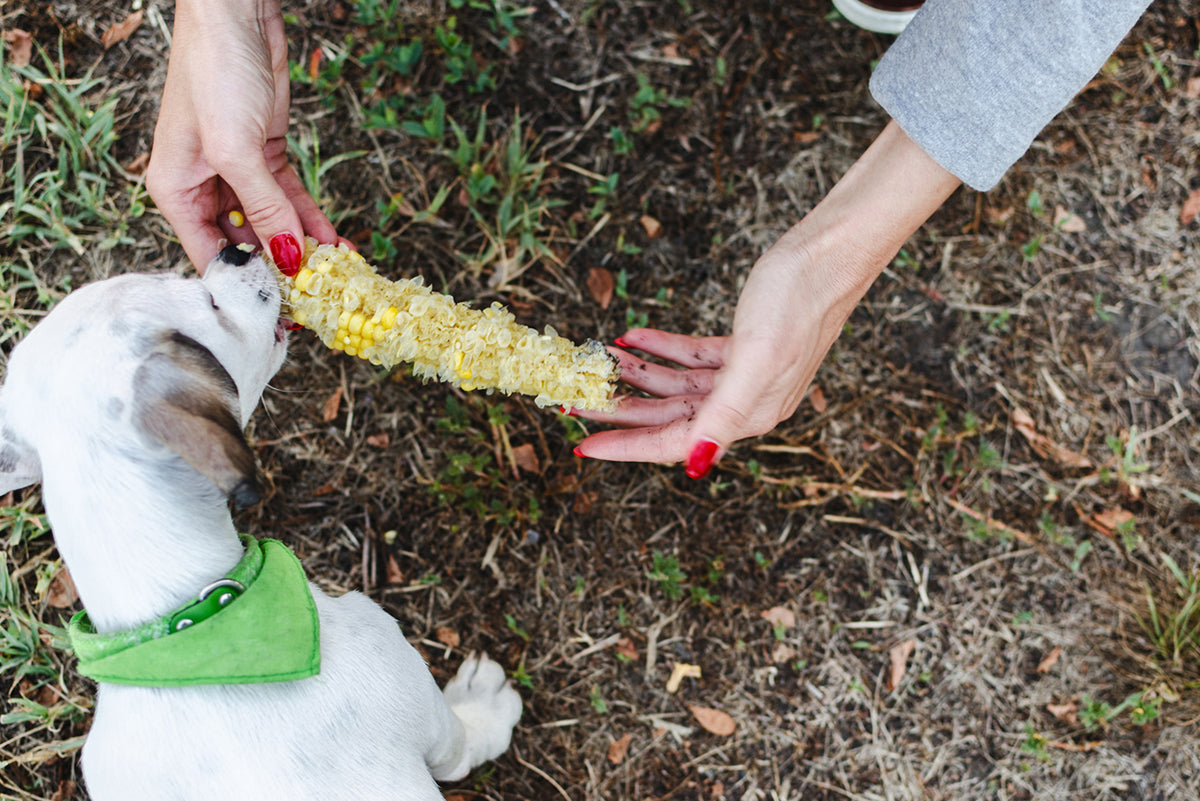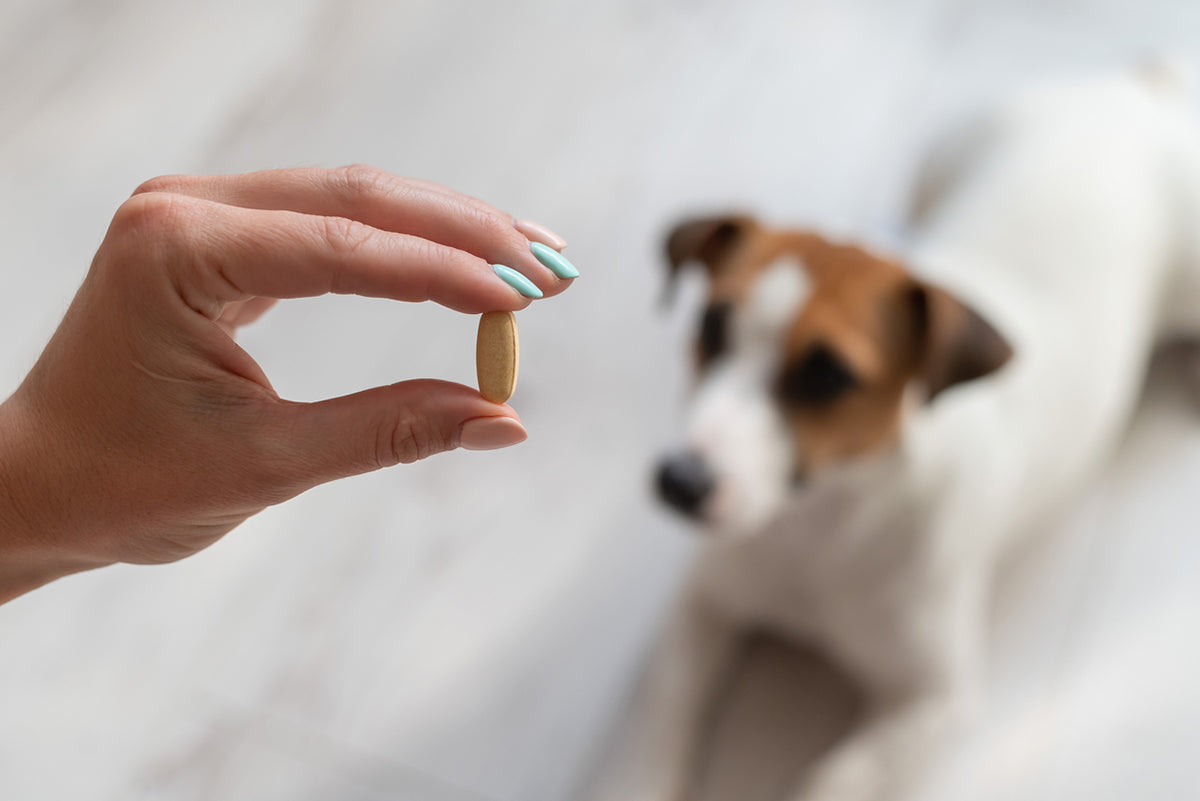Humans have cultivated corn since time in memorial. After centuries of growing different varieties of corn, people came to realize that the colorful kernels not only make up for a delicious meal, but also have thousands of other uses. From corn syrup and livestock feed, to things as diverse as fireworks, cosmetics, and antibiotics, there are many uses that humans find for corn.
As delicious and useful as corn is, there are several concerns you may have after catching your furry friend snacking on the yellow bushels on the cob. Should you give cob to your dog? Should you be worried if they ate corn or corn cob? These are some of the questions we will answer in this article. We will also go over what to do if they eat it without your knowledge.
Let's get to it, shall we?
Can Dogs Eat Corn?
Yes, they can. As long as your dog is healthy, you can feed them corn. Most people eat their corn with butter, salt and pepper, but your dog shouldn't. You should make sure the corn is free from those things before sharing it with your dog.
Although food allergies are relatively uncommon in cats and dogs, and allergies to grains even rarer, there is no point in taking the chance. You should make sure your dog is not allergic to corn before feeding it to them by consulting a vet or using an at-home dog allergy test.
Also, don't feed your dog corn if it is a puppy – or any other solid human food for that matter. Not that it causes direct problems but it is better to wait until they are adults and have adjusted to a balanced, nutritious meal routine.
Is Corn a Good Dog Food?
Yes, it is. But like almost all other foods, it would be best if you fed it to them in small amounts. It has the highest starch content among all whole vegetables so eating too much of it could cause obesity.
Does Corn Have Any Nutritional Value for Dogs?
Yes, it does. That is why it is an ingredient in so many dog foods. It is a very good source of:
- Protein and amino acids that strengthen their muscles and boost the health of their fur and skin.
- Linoleic acid, an Omega-6 fatty acid that our furry friends can't produce by themselves. It boosts their immune system and helps maintain healthy skin and coat.
- Antioxidants and vitamin E – to boost their immune system
- Fiber – which is important for stomach and gut health and motility
- Carbohydrates – to give them energy
Can Dogs Eat Corn Cobs?
Yes, they can. But you should never let them. If you find any cob lying around, it poses a serious health risk to your pooch, so you should get rid of it.
Why Is It Not Good for Dogs to Eat Corn Cobs?
Your dog could easily swallow the cob, which is a choking hazard. The pieces of corn cob can cause gastrointestinal obstruction if lodged in the dog's intestines. The intestinal blockage leads to vomiting, weakness, diarrhea, bloating, whining and abdominal pain among others. Although it may not be a problem for big dog breeds as it is for small dogs, it is much safer if you don't take the chance.
Even if they chew on it completely, they cannot digest corn cobs. It may even cause perforation if they make it to the intestines.
Can Dogs Eat Corn Cob Husks?
Yes, they can but it is not recommendable. They could be alright, except for a little gas, after eating cob husks but just like any other fruit or vegetable skin, it is harder to digest. It also has no nutritional benefits so there is no point in letting them eat it.
Probiotic Nutrient Enhancer
Best-on-the-market w/ 15 Billion active cultures
Maximize Your Dog's Nutrient Absorption And Support Healthy Digestion
Learn MoreCritical Immune Defense
w/ Turkey Tail, Reishi, Shiitake, & Maitake Mushrooms + White Turmeric Root Extract
Fight Viruses, Diseases and Cancers
Learn More
What Do You Do if Your Dog Eats a Corn Cob?
If you are completely sure your dog has swallowed a corn cob, you should contact a vet immediately. Even if they can't help you immediately, they will give you valuable advice. The longer you wait, the more uncomfortable and unwell your dog becomes.
What Are the Symptoms of Corn on the Cob Ingestion?
As mentioned above, if you are sure your dog swallowed a cob in whole, you should contact a vet immediately. But if you aren't sure they did, keep an eye on them for the following symptoms:
- Vomiting, especially when repetitive
- Weakness
- Diarrhea
- Loss of appetite
- Dehydration due to inability to hold any water down
- Bloating
- Abdominal pain
- Hunching or whining
How Can I Help My Dog Pass a Corn Cob?
If your dog ate the corn cob within a few hours, don't be tempted to induce vomiting by yourself. It is best that a vet handles it through an injection. Doing it yourself is life-threatening and can damage your friend's stomach and esophagus.
If you don't want to induce vomiting or the time has passed, you shouldn't help your dog poop the corn cob. That decision should come from a vet and that is why you need to visit one immediately.
The vet will perform physical examinations that may include an x-ray of the dog's stomach to determine whether you should let your friend pass it naturally, they need emergency surgery, or it should be removed through their mouth by inserting specialized tools. These are decisions you cannot make yourself without risking your dog's life.
What Is the Nutritional Content of Corn Cobs?
According to feedipedia, corn cobs have about 5% protein and 80% fibre. Although these nutrients are beneficial to dogs, why would you risk a dog's life for only 5% protein?
Can My Dog Eat Popcorn?
Yes, they can. As long as it is plain, air-popped popcorn without butter, salt, and any other seasonings and ingredients, it is safe to enjoy your bucket of popcorn with them. Popcorn is high in fiber and carbohydrates which provides your dog with extra energy.
However, you should make sure that each popcorn they eat is popped. Your dog cannot digest the pieces that aren't completely popped. Eating them could lead to stomach upsets. Also, stay away from pre-packaged popcorn. They contain sodium, oils and artificial flavors that can mess with your dog's digestive system.
After eating the popcorn, remove any that sticks on their teeth to prevent problems such as tooth decay or gum disease
Is Sweet Corn Dangerous for Dogs?
No, it's not. As long as it's off the cob and cooked, it is as safe as regular corn.
What Are Some Other Ways to Get My Dog to Eat Corn?
There are several corn types and products that contain corn. Here are the forms and types of corn that are safe for your dog.
- Corn kernels
- Canned corn
- Corn chips (unseasoned)
- Corn flakes
- Baby corn (cut it up into small pieces if you have a smaller dog)
- Corn starch
- Corn dogs
- Corn tortillas
- Cornmeal
- Corn muffins
- Frozen corn
You should read the ingredients in the products mentioned above before feeding them to your dog unless you are sure they aren't allergic.
Conclusion
If you want to share some cob with your furry friend, then go ahead. It won't harm them in any way as long as you do it in moderation. But keep them away from corn cobs because they pose serious health risks, and corn husks because they don't have any nutritional value.
If your dog has hip or joint problems, you would like to enhance their nutrient absorption, build their immune defense, or take care of their oral health, check out the scientifically formulated products over at Pet Wellness Direct.











